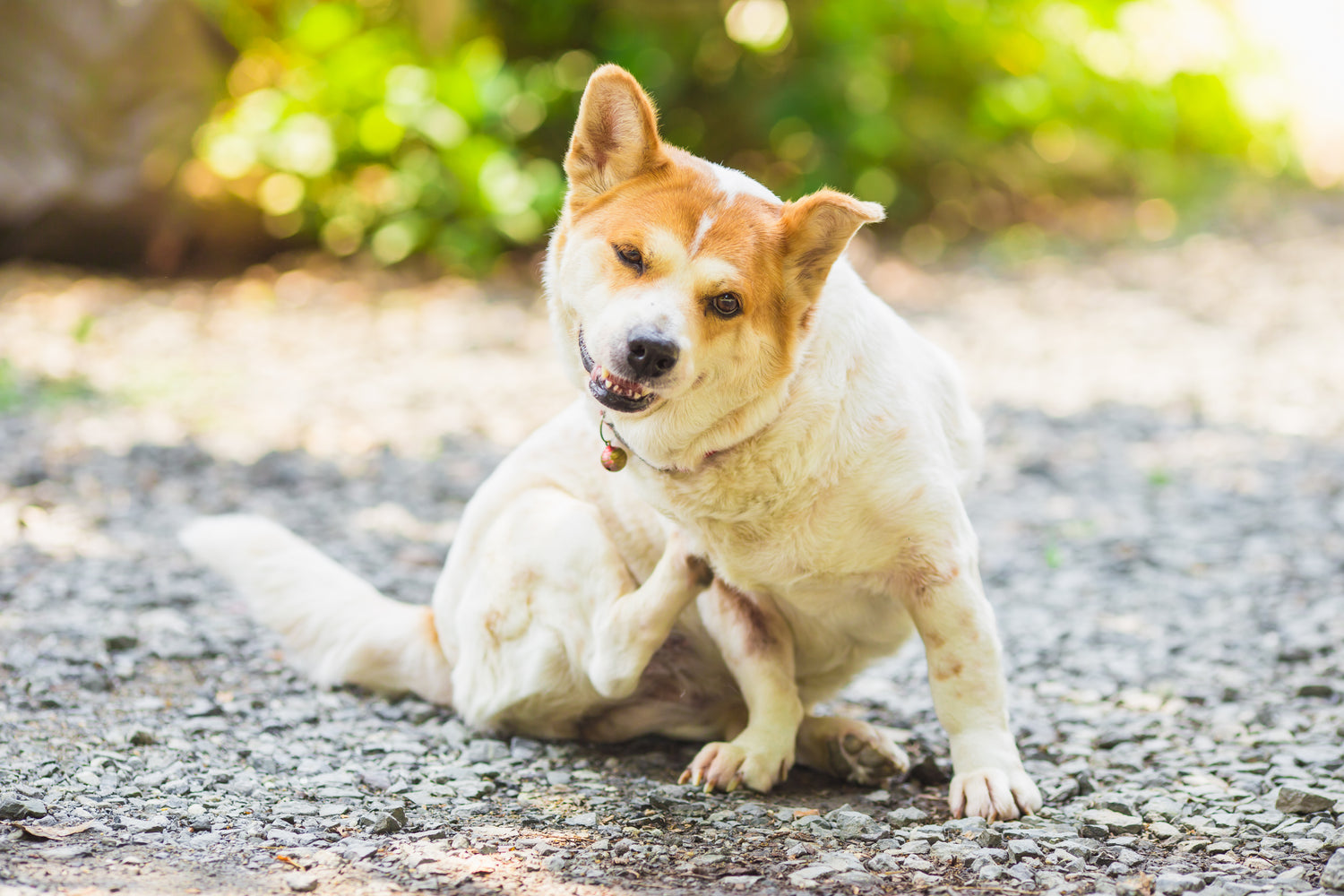Is your dog scratching more than ever lately? Do they keep having sneeze attacks? Your miserable fur baby may have a case of allergies. Not only do allergies make your dog physically uncomfortable, they can make your normally playful energetic friend a little down in the dumps.
Let’s learn more about dog skin allergies and how to relieve them, so you and your four legged friend can get back to adventuring together.
What Are Dog Allergies?
Just like in pet owners, an allergic response in dogs is caused by their immune system overreacting to allergens. Allergies can be caused by food, ear infections, fleas, dust mites, pollen, grass, and a host of other things.
Flea Allergy Dermatitis
Flea allergy dermatitis is caused by, you guessed it, fleas! There is nothing worse than seeing those little, tiny, moving black dots on your dog's skin. But, if you think it is bad for us (cue cleaning, washing, treating the yard), it is 100 times worse for our poor pups. Not only can they be allergic to the bites, but some dogs are even allergic to the saliva of the fleas, which makes for a double whammy.
Food Allergies
While most dogs may not have true food allergies, they may have food sensitivities. We are all aware of how dangerous a peanut allergy in humans can be, and dogs can have allergies to foods that cause these same reactions, however it is quite rare. Usually, food sensitivities can cause an upset stomach, itching, or changes in your dog’s coat.
Environmental Allergies
Do you both dread and long for the arrival of spring? Do you rejoice in the beautiful colors of the new flowers, but curse your constant sneezing? Your dog may be feeling the same way.
Seasonal allergies can also affect your poor pooch. Environment allergies can also be caused by the type of soap you use on your dog, fertilizers in the grass, or mold. Environmental allergies can present themselves as itching, sneezing, hives, and even digestive problems.
How Can You Tell If Your Dog Is Experiencing Allergies?
Sneezing, coughing, diarrhea, and coat changes can all be signs of eczema or an allergic reaction, but the most common sign in dogs is itching. Do you notice your dog is scratching or chewing at their leg more? Are they messing with their ears?
You may want to schedule a trip to your dog’s vet to rule out anything other than allergies. There are tests available, through your vet, to find out what your pet is allergic to. However, it is sometimes obvious what your dog is allergic to. For example, if every time your dog goes into the grass to play or to get their salad on (seriously, why?) do they come back in with an itchy or swollen snout? This may be a sign of an allergy to grass.
Relieving Your Dog’s Allergies at Home
While there isn’t necessarily a cure for allergies, there are ways to alleviate symptoms and provide supplements to help your dog's immune system. No matter what is making our sweet fur baby have an allergic reaction, relieving their agony is the number one goal.
Here are some ways to relieve your dog’s symptoms with products you probably already have at home. Not surprisingly, most of these are solutions you have probably used on yourself.
Apple Cider Vinegar
Apple cider vinegar seems to be a cure-all for everything these days. Did you know it can also help your pet with irritating skin from allergies? Apple cider vinegar is great for soothing skin.
While the ratio can be tweaked for your pet’s needs, a 50/50 ratio of water to apple cider vinegar is a good place to start. Put the mixture in a spray bottle to spray the hot spots. This is not a great solution if there are cuts on the skin, as it can burn if it gets in a cut.
Apple cider vinegar also repels fleas. If fleas are the reason for your dog's allergic reaction, this can be a double bonus when using apple cider vinegar. While you may not love the smell of vinegar, neither do fleas, so spritzing your dog with your water and vinegar solution can help to move those little pests along.
Coconut Oil
Honestly, what can’t coconut oil do? So much research is coming out on the benefits of coconut oil for people, but veterinarians are starting to understand the benefits for dogs, as well.
Coconut oil is a great relief for itchy skin. You can use it topically on itchy spots or even bites. The nice thing about coconut oil is you can simply use it right out of the jar, and it is safe (and even beneficial) for your curious canine to consume.
Coconut oil can also be great for any digestion issues caused by an allergic reaction. You can add a tablespoon to your dog's food or freeze it for a fun treat.
If you have any questions about adding coconut oil to your pet’s diet, always ask your veterinarian.
Oatmeal Baths
Oatmeal baths provide instant relief to irritated skin. Oatmeal is a natural moisturizer, and can help with dry skin. If your dog is a fan of warm baths, then this is an easy way to give them relief.
Making an oatmeal bath is easy. Take plain oats from your pantry and grind them into a fine powder, using a coffee grinder or food processor. Add the powder (the ratio will depend on your dog’s size, but ⅓ cup to one cup water should do the trick) to a bath with warm water.
Fill the bath as high as their belly, and pour the bathwater over their back. Massage irritated areas, and let your dog soak for ten minutes, or until they have had enough. Give them a rinse with fresh water, and towel them dry.
Aloe Vera
What's the first thing you reach for when you have a dreaded sunburn? Aloe! Why? It has many soothing and relaxing properties that it can offer along with a nice cooling effect. These are all reasons why aloe is great for relieving irritated skin from your dog’s allergies. To use it is as simple as putting the gel on affected areas.
Supplements
There are ways to help your dog fight an allergic reaction from the inside out. Supplements are a great way to boost your dog’s immune response. Things you should look for in a supplement specifically formulated for allergies are bromelain, nettle, and quercetin. Each of these ingredients are anti-inflammatory, which can help with sneezing, coughing, and skin irritations.
Conclusion
Allergies in dogs can be caused by many things including food, fleas, and environmental allergens. While these allergies can cause unfortunate symptoms like dry, itchy skin, sneezing, infections, inflammation, or stomach issues, there are ways to help alleviate them.
Apple cider vinegar, coconut oil, or aloe vera can be put on the skin to calm any itching. A relaxing oatmeal bath can relieve itching, burning, and dry skin. Supplements help fight off an allergic reaction from the inside, and with ingredients like quercetin, bromelain, and nettle being powerful contenders to keep an eye out for.
Are you and your furry sidekick ready to get back out there and explore the world together, without the itching and sneezing? Try these home remedies and get back out there.
At WINPRO Pet, keeping dogs healthy and active is our goal. Our supplements are made with all natural ingredients, taste great, and support your dog’s overall health.
Sources:
Dog Allergies: Symptoms and Treatment | American Kennel Club (akc.org)




